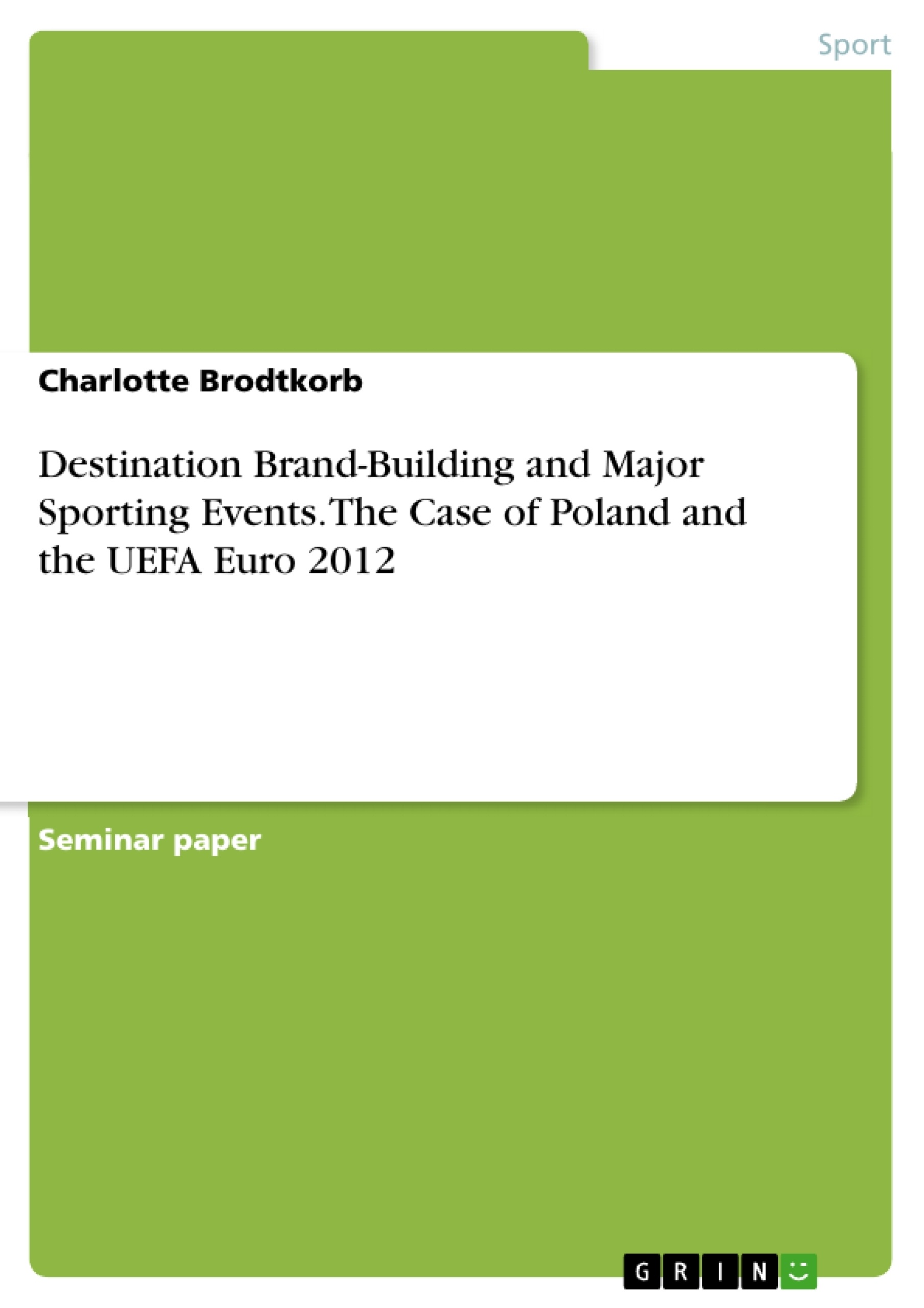This report examines how Poland capitalised on the opportunities associated with the country’s co-hosting of the UEFA EURO 2012 with regards to building a destination brand and identifies strategies that may be implemented in order to further establish and strengthen this brand.
In the course of this report the "6Ts of creative destination reputation" are applied to Poland specifically in the context of the country's co-hosting of a major international football event in 2012. It also gives some historical background on the development of the tourism sector in Poland in the last decades and examines and analyses both outcomes of the UEFA 2012 and the associated destination brand-building campaign "Feel Invited" for the country.
Poland's co-hosting of the EURO 2012 has provided the local Destination Marketing Organisation with opportunities to be exploited in terms of building competitive destination brand for the country. This report explores how these opportunities were exploited, taking into account the image of Poland that was held within its target markets for international tourism before and after the event. Finally, it assesses the success of the brand-building initiative during EURO 2012 and gives recommendations with regards to possible future challenges in destination branding the Polish Tourism Organisation should be aware of, as well as how this awareness may influence upcoming campaigns.
Inhaltsverzeichnis (Table of Contents)
- Introduction
- Terms of Reference
- Poland as a destination
- Tourism to CEE and Poland in particular
- Perception of Poland as a destination by Western Europeans pre-EURO 2012
- Destination Branding Challenges for Poland
- Creating a viable Destination Brand for Poland
- The successful Destination Brand
- Poland's Ts in the creation of a creative destination reputation
- Tradition
- Testimonies
- Channelling Tradition and Testimonies into Tone
- Leveraging a Major Sporting Event in terms of Destination Branding
- "Feel Invited"
- Communicating "Poland-Feel Invited" during EURO 2012
- "Come Back"
- Future challenges in firmly establishing the "Feel Invited" brand
- Lack of appeal to non-football supporters
- Possible negative effects of EURO 2012 on country image
- The risk of losing momentum
- "Feel Invited"
- Conclusions & Recommendations
- Conclusions
- Recommendations
Zielsetzung und Themenschwerpunkte (Objectives and Key Themes)
This report aims to explore how Poland capitalized on the opportunities presented by co-hosting the UEFA EURO 2012 in order to build a competitive destination brand. It focuses on the image of Poland within its target markets for international tourism before and after the event. The report further assesses the success of the brand-building initiative and outlines possible future challenges for Poland's destination branding efforts. Key themes and ideas explored in this report include:- The importance of destination branding in the competitive tourism landscape
- Leveraging major sporting events to enhance destination branding
- Challenges and opportunities in building a destination brand for Poland
- Assessing the success of the brand-building initiative during UEFA EURO 2012
- Recommendations for future destination branding campaigns in Poland
Zusammenfassung der Kapitel (Chapter Summaries)
- The introduction sets the context for the report, highlighting the increasing competition among destinations for events and tourism, particularly in light of the emergence of new destinations with more cost-effective options.
- The "Terms of Reference" section outlines the scope and purpose of the report, which aims to examine how Poland leveraged the opportunities associated with co-hosting EURO 2012 for destination branding and identify strategies for further establishing and strengthening the brand.
- The chapter on "Poland as a Destination" explores the country's tourism landscape, focusing on the development of international tourism in Central and Eastern Europe (CEE) after the dissolution of the USSR. The chapter then delves into the perception of Poland as a tourist destination by Western Europeans before the EURO 2012 event.
- The chapter titled "Creating a Viable Destination Brand for Poland" discusses the elements of a successful destination brand and examines how Poland's specific characteristics, including its tradition and testimonies, contribute to its overall creative destination reputation.
- The "Leveraging a Major Sporting Event in terms of Destination Branding" chapter explores the "Feel Invited" campaign implemented by Poland during EURO 2012, outlining the key communication strategies employed and the event's impact on the country's image. This chapter also addresses future challenges for maintaining and solidifying the "Feel Invited" brand.
Schlüsselwörter (Keywords)
This report focuses on key concepts including: Destination branding, tourism marketing, event management, UEFA EURO 2012, Poland, CEE tourism, brand building, creative destination reputation, international tourism, image management, stakeholder engagement, and the "Feel Invited" campaign. The research aims to provide insights into the strategies and challenges associated with leveraging major sporting events for building a competitive destination brand, specifically in the context of Poland and its efforts to attract international tourism.Frequently Asked Questions
How did Poland use UEFA EURO 2012 for destination branding?
Poland leveraged the event to change international perceptions and launched campaigns like „Feel Invited“ to build a competitive destination brand.
What were the challenges for Poland's image before 2012?
Western Europeans often held outdated perceptions of Poland, focusing on its communist past rather than its modern, creative potential.
What are the „6Ts of creative destination reputation“?
The report applies these factors—including Tradition and Testimonies—to analyze how a country can build a creative and viable brand reputation.
What was the goal of the „Feel Invited“ campaign?
It aimed to communicate hospitality and openness during the tournament to encourage tourists to visit and return to Poland.
What future challenges does Poland face in branding?
Key risks include losing momentum after the event, potential negative country image effects, and a lack of appeal to non-football fans.
- Quote paper
- Charlotte Brodtkorb (Author), 2012, Destination Brand-Building and Major Sporting Events. The Case of Poland and the UEFA Euro 2012, Munich, GRIN Verlag, https://www.grin.com/document/448938



